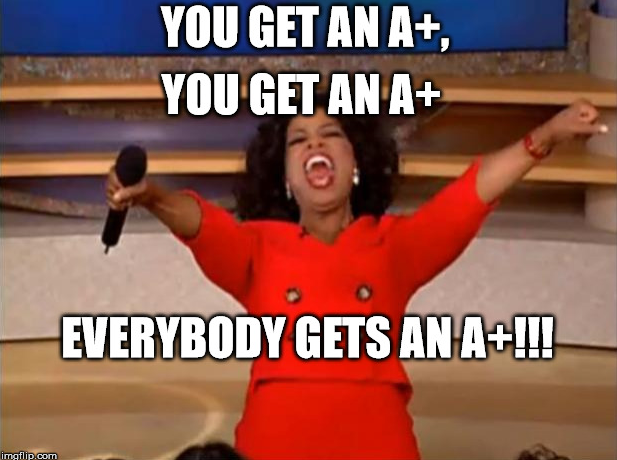Summer has long been the season for local community sports and contests. In recent years, these contests have been particularly marked by the everyone-gets-a-trophy mentality where each individual gets recognition and a prize for their time and effort.
For better or worse, that mentality may now be expanding beyond the summer community center and into the school classroom.
The Washington Post explains:
“Under a new policy in Virginia’s Fairfax County, one of the nation’s largest school systems, middle and high school students can earn no lower than a score of 50 if they make a ‘reasonable attempt’ to complete work. And for the first time this year, high school teachers who were going to fail a student had to reevaluate the student using ‘quality points,’ making an F less detrimental to a student’s final grade. Prince George’s County in Maryland will limit failing grades to a 50 percent minimum score when students show a ‘good-faith effort.’”
Fairness and an eagerness to encourage students to stay in school are at the root of this new trend. But while students may not be doing their best work in school, they’re not dumb when it comes to working the system, as English teacher Sam Hedenberg is quick to note:
“One student was able to pass his class even though he skipped several essay-writing assignments. ‘Many students have already started to figure out that they don’t have to do very much but they can still pass,’ he said.”
This whole process sounds eerily similar to what the demon Screwtape predicted would happen in C.S. Lewis’ essay, Screwtape Proposes a Toast. In one passage in particular, Screwtape explained to his fellow demons that:
“The basic principle of the new education is to be that dunces and idlers must not be made to feel inferior to intelligent and industrious pupils. That would be ‘undemocratic’. These differences between the pupils – for they are obviously and nakedly individual differences – must be disguised.”
The disguise, Screwtape goes on to say, can occur at several levels:
“At universities, examinations must be framed so that nearly all the students get good marks. …
All incentives to learn and all penalties for not learning will vanish. The few who might want to learn will be prevented; who are they to overtop their fellows? And anyway the teachers – or should I say, nurses? – will be far too busy reassuring the dunces and patting them on the back to waste any time on real teaching.”
It’s true that no parent, teacher, or adult in general wants to see a student fail.
But if we are continually propping up those who fail, are we putting not only them, but all students at risk of a poorer quality education by training them that excellence is not necessary?
















1 Comment
Yuzu21
July 6, 2023, 8:55 pmEver since the government enforced integration, schools have been steadily dumbed down to accommodate blacks.
REPLYIt has ruined our education system, but what hasn't integration ruined?